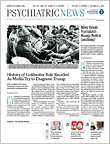Ten years ago, Robert Freedman, M.D., and Susan Schultz, M.D., editor-in-chief and deputy editor, respectively, of the American Journal of Psychiatry (AJP) conceived the Residents’ Journal to facilitate ongoing collaboration between medical students, residents, and psychiatry fellows. In its infancy, it included instruction to trainees from the AJP editors on how to navigate the “green book” that arrives in our mailboxes each month. For trainees, they realized, it can be difficult to know where to start.
Over the past decade, the Residents’ Journal has come to embody a truism of academic medical training: the best learning takes place by doing. And so the Residents’ Journal has evolved into its present form: a publication written and edited by and for psychiatry trainees.
When I submitted a manuscript during my second year of residency, I didn’t envision how integral the Residents’ Journal would become in my life and to my training. I don’t think there is any way to articulate how publishing enhances clinical experiences and how much our clinical and life experience gives way to wonderful prose.
From recording a podcast, becoming the editor of a theme issue, or writing one of the following article types, the Residents’ Journal is a symbol of what we can accomplish during our training through collaboration. I invite every medical student, psychiatry resident, and fellow to submit a manuscript this year, record a podcast episode, and be part of our collective voice and journey through psychiatric training.
Theme Issues
It should be noted that while there will be several theme issues this year, there will also be issues without a theme. Therefore, most topics can easily find a home in the Residents’ Journal.
These are the themes scheduled to date:
•
Suicide risk and prevention. If you would like to write on this topic, please contact me at
[email protected].
•
Medical conditions and child psychopathology. If you would like to write on this topic, please contact our guest section editor, David Saunders, M.D., at
[email protected].
•
If you have written for the Residents’ Journal and want to edit a section, contact me at the email above.
Article Types
•
Commentaries are opinion pieces on a topic of the writer’s choice.
•
Letters to the Editor are shorter reflections on a subject touched upon in a prior issue of the Residents’ Journal.
•
History of Psychiatry pieces allow us to learn about and reflect on our field in a historical context.
•
Reviews of the academic literature on a topic of the writer’s choice are powerful opportunities to learn and teach.
•
Case reports gives us an opportunity to share what we’ve observed and learned during our residency.
•
Book and movie reviews create important dialogues about what we encounter in the media.
•
Our Perspectives on Global Health column is a vehicle for sharing insights from scholarly projects abroad.
Our
Arts & Culture column is a forum for creative nonfiction. Please contact our Culture Editor, Aparna Atluru at
[email protected] for more information.
For a list of manuscript types and guidelines for submission, please click
here.
Podcasts offer another entry point for trainees to interact with the journal. Podcasts are an invaluable educational tool for readers to learn from and teach one another.
On behalf of the editorial board, we hope you will find time this year to submit a manuscript to the American Journal of Psychiatry Residents’ Journal. ■

